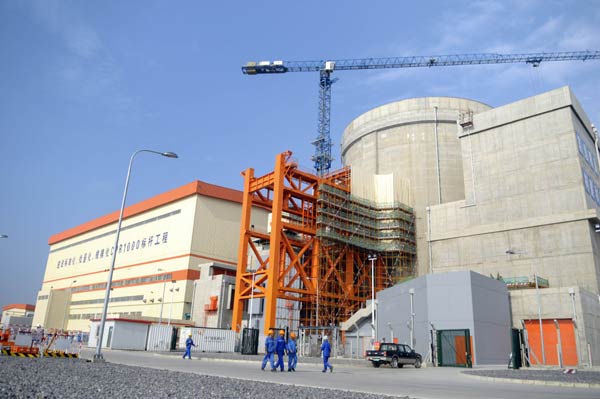China's nuclear plant plans get new momentum
By LYU CHANG (China Daily) Updated: 2015-03-05 07:59
 |
|
Unit 1 at the Hongyan River nuclear power plant near Dalian, Liaoning province. China plans to have 58 gW of nuclear power in operation by 2020 and at least 30 gW under construction.[Photo/Xinhua] |
State Council gives green light for two reactors at Hongyan River in Liaoning
China's nuclear energy development plans got a fresh impetus on Wednesday after the State Council gave the green light for new reactors at the Hongyan River nuclear power plant.
According to industry sources, units 5 and 6 of the Hongyan River nuclear plant in the northeastern Liaoning province got construction approval from the State Council before the Lunar New Year.
"It is a big step forward for China to revive the industry and more nuclear projects are expected to start construction this year. However, the official documents are yet to be finalized," a source in a State-owned nuclear company told China Daily.
New nuclear projects are also in the pipeline, the source said, adding that the moves would help optimize China's energy mix amid mounting pressure from air pollution.
Tang Bo, an official at the National Nuclear Safety Administration, said earlier that the regulatory body has been working on the environmental impact assessment and safety inspection of nuclear projects including the Hongyan River nuclear project, the Shidao Bay nuclear demonstration project in Shandong province and units 5 and 6 of the Fuqing nuclear power plant in Fujian province.
"We have drawn up a draft list of new projects for final approval," he told China Daily earlier. "Our job is to clear the potential risks and help with the technical preparation of the nuclear sites before the government's final approval," he said.
Following the Hongyan River nuclear project, units 5 and 6 of the Fuqing nuclear power plant are the next possible candidates for approval, experts said.
"The Fuqing nuclear project will possibly get the nod from the government in April at the earliest," the source said.
The equipment purchase order for units 5 and 6 of the Fujing nuclear power plant, which uses the Hualong One reactor design, known as the third-generation nuclear technology, is nearly complete, the source said.
China, with the world's largest number of nuclear power plants under construction, is now pushing ahead to embark on a program of new nuclear projects to reduce the proportion of fossil fuels in its primary energy consumption.
Last year, the State Council rolled out an energy plan to have a more efficient, self-sufficient, green and innovative energy production and consumption mechanism.
The plan targets to have 58 gigawatts of nuclear power in operation by 2020 and at least 30 gW under construction. To meet that target, China needs to add at least another 10 gW of installed capacity with approval of six to eight reactors each year, according to estimates from industry experts.
After the Fukushima Daiichi nuclear disaster in Japan in 2011, China suspended approval for nuclear plants in order to revise its safety standards. However, it lifted the ban on new nuclear power stations at the end of 2012, and said it would only approve projects proposed for coastal areas within 2015.
- Israel requests to join Asian Infrastructure Investment Bank
- Chinese stocks rebound on April 1
- China, the West in Africa: more room for cooperation than competition
- Nanjing cuts taxi franchise fees
- Air China increases flights to Milan, Paris
- JD.com raises delivery charges
- Veteran corporate strategist upbeat about China economy
- L'Oreal China sales revenue up 7.7% in 2014

















